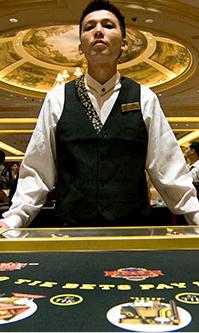 Gambling is illegal in China, but not in Macao, where apparently many Chinese officials have been taking jaunts to gamble embezzled government money. These gambling trips have apparently cost Chinese officials an average of $2.7 million dollars each in a 2008 study of high rollers in Macao.
Gambling is illegal in China, but not in Macao, where apparently many Chinese officials have been taking jaunts to gamble embezzled government money. These gambling trips have apparently cost Chinese officials an average of $2.7 million dollars each in a 2008 study of high rollers in Macao.
The Chinese government has previously tried clamping down on gambling by public officials with little success. The government is now trying a new tack that seems to be working, which is limiting travel visas to Macao for government officials to one trip every 3 months for no longer than 7 days each. These restrictions have helped turn what was a boom economy in Macao (which depends on gambling for 75% of its tax base) into a bust.
I’m no stranger to gambling either, having spent much of my free time in my adult life tagging behind my parents in casinos in Atlantic City, Las Vegas and Reno/Tahoe. Ironically, there’s a stereotype in American culture that Asians are quite intelligent as a group. We’re lauded as the hard workers in school and work. That is quite a compliment to members of an ethnic group. It’s also well known that the Chinese like to gamble. Casinos cater to Asian guests and ads are run on the Chinese channels here in the Bay Area courting Chinese gamblers.
If you think about it, these two things “intelligence” and “gambling” don’t quite go together. If you’re scientific and knowledgeable, you know the odds are against you in Vegas. The house always wins. So why do so many smart, intelligent Chinese flock to Vegas (and Macao) in hopes of cashing in big?
In addition to supposedly being level-headed and intelligent, Chinese culture very strongly believes in the concept of “luck”. You can’t be a rational intelligent gambler, if you don’t believe in “luck”. Maybe that’s why I always do so poorly when I’m in Vegas.
In Chinese culture, you have the color red, signifying luck. Red envelopes are handed out at New Years containing lucky money, the bridal dress is red, as is the wedding reception room. Banners flown for luck are all done in red. In addition words that sound like luck are often used symbolically for luck. Bats are used as decorative symbols in pottery, as are swastikas. The word for bat is “fu” and sounds like the word for happiness. The swastika as a lucky symbol, of course pre-dates the Nazi use of the symbol. There are many examples of symbols of good luck in Chinese culture today as well, including the gift of oranges, the serving of 8 or 9 courses, including “long-life” noodles at banquets, the use of fish (carp) as symbols of luck and money.
So the Chinese continue to flock to Vegas and Macao, in the belief that our luck will change, that there’s good fortune coming, especially because of that good deed you did the other day (did I forget to mention Karma is a big part of Chinese belief as well?). Even if you lose in Vegas today, your luck will change and you’ll be a winner tomorrow.
So much for the Asian stereotype of being smart!







